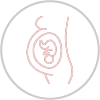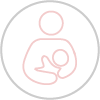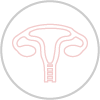During pregnancy, many women experience at least some degree of urinary incontinence (involuntary loss of urine). The incontinence can be mild or infrequent for some women, but more severe for others. Factors influencing the severity of symptoms can range from size of baby, position of baby, multiple babies, previous urinary incontinence, other medical problems, number of children and previous types of deliveries.
Urinary incontinence usually presents itself during the 2nd and 3rd trimesters. During pregnancy, the expanding uterus puts pressure on the bladder. The muscles in the bladder sphincter and the pelvic floor muscles, which work to control the flow of urine, can be overwhelmed by the extra stress and pressure on the bladder. Urine may leak out of the bladder when there is an additional pressure exerted onto it, e.g. when a pregnant woman coughs, sneezes or exercises. This is called Stress Urinary Incontinence (SUI) – the ‘stress’ is anything causing increased pressure within the abdomen. When the pelvic floor muscles are over-stretched from the weight of the uterus, they cannot withstand this pressure very well and therefore can’t do their job of keeping you continent!
Women may also experience an overactive bladder during pregnancy. Women need to urinate more frequently, often having to rush to get to the bathroom. Sometimes a leak can happen on the way, or once there. During pregnancy, the bladder gets squashed, pressed, jumped on, kicked and stretched. This causes irregular nerve signals telling the bladder to tighten at inappropriate times, or empty more frequently, especially if the bladder size is compromised.
This is something to keep an eye on post childbirth, as can lead to poor habits of visiting the toilet too frequently – leading to a ‘weak bladder’ long term.
Physiotherapy for Ante Natal Incontinence:
- In depth assessment of obstetric and gynaecological history, conditions and concerns
- Teaching correct pelvic floor exercises – technique, effort, type and quantity
- Teaching exercises to increase other muscle activity to support pelvic floor – abdominals, buttocks etc
- Activity modification – work, lifestyle, hobbies, household etc
- Bladder training advice, healthy bladder advice



